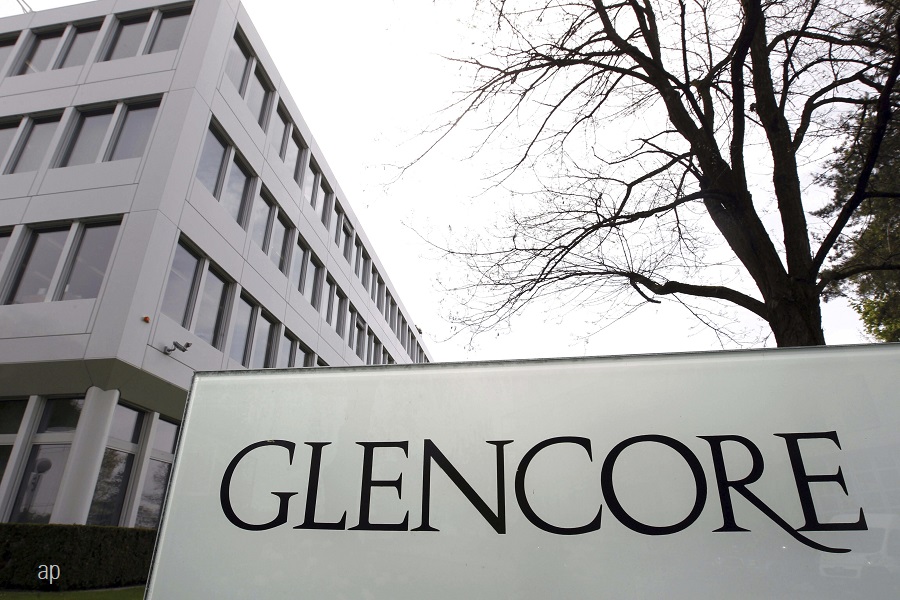(Alliance News) - The following is a summary of top news stories Tuesday.
----------
COMPANIES
----------
Swiss miner and commodities trader Glencore reinstated its dividend as it reported on annual earnings against a tough backdrop brought about by the coronavirus pandemic and the need to address environmental demands. For 2020, revenue was down 34% to USD142.34 billion from USD215.11 billion in 2019 and the net loss widened to USD1.90 billion from USD404 million. Glencore's 2020 adjusted earnings before interest, tax, depreciation and amortisation was USD11.56 billion, marginally down from USD11.60 billion and beating consensus forecasts of USD10.70 billion. Adjusted Ebit came in at USD4.42 billion, up 6.5% from USD4.15 billion in 2019. The latest adjusted Ebit figure beat consensus of USD3.63 billion. Glencore recommended a payout of USD0.12 per share, having scrapped its dividend in August last year due to the pandemic. Glencore promised "responsible stewardship of declining coal business over time as industry decarbonises". The miner also set a net zero carbon emissions ambition for 2050.
----------
Anglo-Australian miner BHP Group hiked its interim dividend, as profit and revenue rose on higher metal prices and strong output at several of the group's assets. For the six months to the end of December, pretax profit rose 13% to USD8.83 billion from USD7.79 billion the same period the year before, on revenue that grew 15% year-on-year to USD25.64 billion from USD22.29 billion. BHP's profit performance was helped by a rise in iron ore and copper prices, as well as record output from its Western Australian Iron Ore business and record average concentrator throughput at the Escondida copper mine in Chile. Profit from operations increased 17% to USD9.75 billion from USD8.31 billion the prior year. BHP raised its interim dividend by 55% to 101.0 US cents from 65.0 cents the year before, while net debt as at December 31 fell 7% to USD11.84 billion from USD12.68 billion.
----------
The World Health Organization gave emergency use approval to AstraZeneca's Covid-19 vaccines on Monday, allowing distribution to some of the world's poorest countries to begin. "The WHO today listed two versions of the AstraZeneca-Oxford Covid-19 vaccine for emergency use, giving the green light for these vaccines to be rolled out globally through Covax," a WHO statement said, referring to the programme aimed at equitable distribution of doses. The two versions given the seal of approval are being produced by the Serum Institute of India, and in South Korea. "Countries with no access to vaccines to date will finally be able to start vaccinating their health workers and populations at risk, contributing to the Covax facility's goal of equitable vaccine distribution," said Mariangela Simao, WHO assistant-director general for access to medicines.
----------
National Australia Bank reported flat profits for the first quarter of its financial year and said ongoing coronavirus lockdowns added to uncertainty going forward. The bank, one of Australia's Big Four lenders, said net profits for the quarter ending December 31 were AUD1.7 billion, about USD1.3 billion, comparable to the same period in 2020. The bank's preferred measure of cash earnings was AUD1.65 billion, up 1.0% on the corresponding period last year. But measured against the quarterly average of the second half of 2020, when Australia was still feeling the economic impact of the coronavirus crisis, cash earnings were up 47%. NAB Chief Executive Ross McEwan said "improving economic trends" were encouraging in Australia and New Zealand as both countries successfully contained Covid-19. "At an underlying level, performance has been sound in the current competitive, low-interest rate environment," he said, adding that the bank had seen a sharp drop in loan repayment deferrals. But McEwan said "health alerts" related to outbreaks of Covid-19 in major cities continued to create "uncertainties requiring further clarity".
----------
Telecommunications firm Liberty Global late Monday said its full-year loss widened slightly, despite a revenue rise, though it posted growth in adjusted earnings. In the three months to December 31, revenue rose 15% to USD3.43 billion from USD2.98 billion a year earlier. For the final quarter, Liberty Global's loss from continuing operations narrowed to USD1.01 billion from USD1.35 billion. For the whole of 2020, however, its loss widened to USD1.47 billion from USD1.41 billion. Full-year revenue was 3.8% higher at USD11.98 billion from USD11.54 billion. Adjusted earnings before interest, tax, depreciation, and amortization rose 5.8% year-on-year in the fourth quarter to USD1.35 billion and by 0.7% to USD4.90 billion in 2020.
----------
MARKETS
----------
Wall Street is pointed higher, as it reopens after a three-day holiday weekend. In Asia and Europe, stock markets also were higher. Glencore shares were up 3.2% in London. Financial markets in Hong Kong reopened, having been closed since a half-day session on Friday, while Shanghai remained closed for the Lunar New Year holiday, reopening on Thursday.
----------
CAC 40: up 0.1% at 5,792.94
DAX 30: up 0.1% at 14,125.91
FTSE 100: up 0.2% at 6,768.99
----------
DJIA: called up 0.6%
Nasdaq Composite: called up 0.4%
S&P 500: called up 0.5%
----------
S&P/ASX 200: closed up 0.7% at 6,917.30
Hang Seng: closed up 1.9% at 30,746.66
Nikkei 225: closed up 1.3% at 30,467.75
----------
EUR: up at USD1.2155 (USD1.2129)
GBP: firm at USD1.3930 (USD1.3909)
USD: flat at JPY105.32 (JPY105.36)
GOLD: up at USD1,824.55 per ounce (USD1,819.49)
OIL (Brent): unchanged at USD63.30 a barrel (USD63.33)
(currency and commodities changes since previous London equities close)
----------
ECONOMICS AND GENERAL
----------
The eurozone economy contracted by 0.6% quarter-on-quarter in the final months of 2020, a smaller fall in economic activity than initially expected, according to data from Eurostat. In the whole of the EU, GDP fell by 0.4%. This follows a strong GDP rebound of 12% from the single-currency bloc in the third quarter of 2020. Earlier in February, a Eurostat estimate showed fourth-quarter eurozone GDP fell 0.7%, so the latest estimate represents a marginally better reading of the health of the euro area's economy. Year-on-year, GDP fell 5.0% in the euro area during the fourth-quarter. For the whole of 2020, eurozone GDP plunged 6.8%, during a year hit by Covid-19 lockdowns.
----------
The 19 eurozone economies are pinning their hopes on quick Covid-19 vaccination to help bounce back as they look to taper off their support strategies for struggling firms, European Commissioner for Economy Paolo Gentiloni said. As well as being a public health priority, "successful vaccination is crucial for the economic recovery," Gentiloni said following a videoconference with eurozone economic and finance ministers. "But what happens to the economy also depends on our decisions," he added, pointing to the importance of using the EU's massive shared EUR750 billion stimulus plan wisely. Speaking alongside Gentiloni, Eurogroup President and Irish Finance Minister Paschal Donohoe said state support measures should remain in place as long as needed.
----------
France's unemployment rate fell in the fourth quarter of 2020, the latest figures posted by INSEE showed. INSEE noted however, that the quarter-on-quarter decline in the unemployment rate was partly down to a resurgence in Covid-19 infections forcing some to inactivity, rather than job searching. On an ILO-basis, the French unemployment rate fell to 8.0% in the fourth quarter, from 9.1% in the third quarter. As a result, the unemployment figure is now just marginally ahead of the 7.9% from a year earlier, before Covid-19's impact.
----------
UK Prime Minister Boris Johnson has said he is "hopeful" coronavirus restrictions can be cautiously eased in the coming weeks, with vaccines providing "grounds for confidence". The prime minister said he wanted the current national lockdown to be the last – and for the unlocking to be "irreversible" – ahead of the publication of his road map next week. Johnson will analyse data this week on coronavirus case numbers, hospital admissions, deaths and the impact of the vaccine rollout as he prepares his plan to reduce restrictions. Preliminary data comparing elderly people who have received the vaccine with those who have not is starting to show it is cutting hospital admissions and deaths, according to The Times. The paper said ministers have already been given data showing vaccines are cutting illness by about two thirds, while a separate study suggests jabs are reducing transmission.
----------
Australia's central bank said "significant monetary support" will be needed for some time yet, according to minutes of its latest fiscal policy meeting. Minutes from the Reserve Bank Of Australia's policy meeting at the start of February said it "would be some years before the bank's goals for inflation and unemployment were achieved". "Given this, it would be premature to consider withdrawing monetary stimulus," the minutes read. "The global outlook remained dependent on the path of the pandemic and on significant fiscal and monetary support. The recovery was likely to remain bumpy and uneven, and most economies were expected to be well below their pre-pandemic trajectories for the level of output for some time. Inflation remained low and below central bank targets in many economies." At the central bank's meeting on February 2, RBA kept Australia's key interest rate at 0.10%.
----------
International companies that want to participate in government investment opportunities in Saudi Arabia will have to establish regional headquarters, Reuters reported, citing Saudi Finance Minister Mohammed al-Jadaan. The news agency said that, as of 2024, the Saudi government plans to cease contracting with companies and commercial institutions whose regional headquarters are not located in the kingdom, in a move aimed at encouraging foreign firms to open a permanent, in-country presence that would help create local jobs. International companies without headquarters in Saudi will be free to work with the private sector, he said.
----------
Most Republicans in the US Senate voted to acquit Donald Trump in last week's impeachment trial, but the former president's woes are far from over. Nancy Pelosi, the Democratic Speaker of the House of Representatives, called on Monday for the creation of a 9/11-style commission to look into the January 6 attack on the US Capitol by Trump's supporters. Pelosi said she would move to establish an "outside, independent 9/11-type commission" to probe the US Capitol assault that left five people dead. The commission would "investigate and report on the facts and causes relating to the January 6, 2021 domestic terrorist attack upon the US Capitol complex", she said in a statement. It would also look into "the interference with the peaceful transfer of power" and the preparedness and response of the Capitol Police and branches of law enforcement.
----------
Copyright 2021 Alliance News Limited. All Rights Reserved.






























